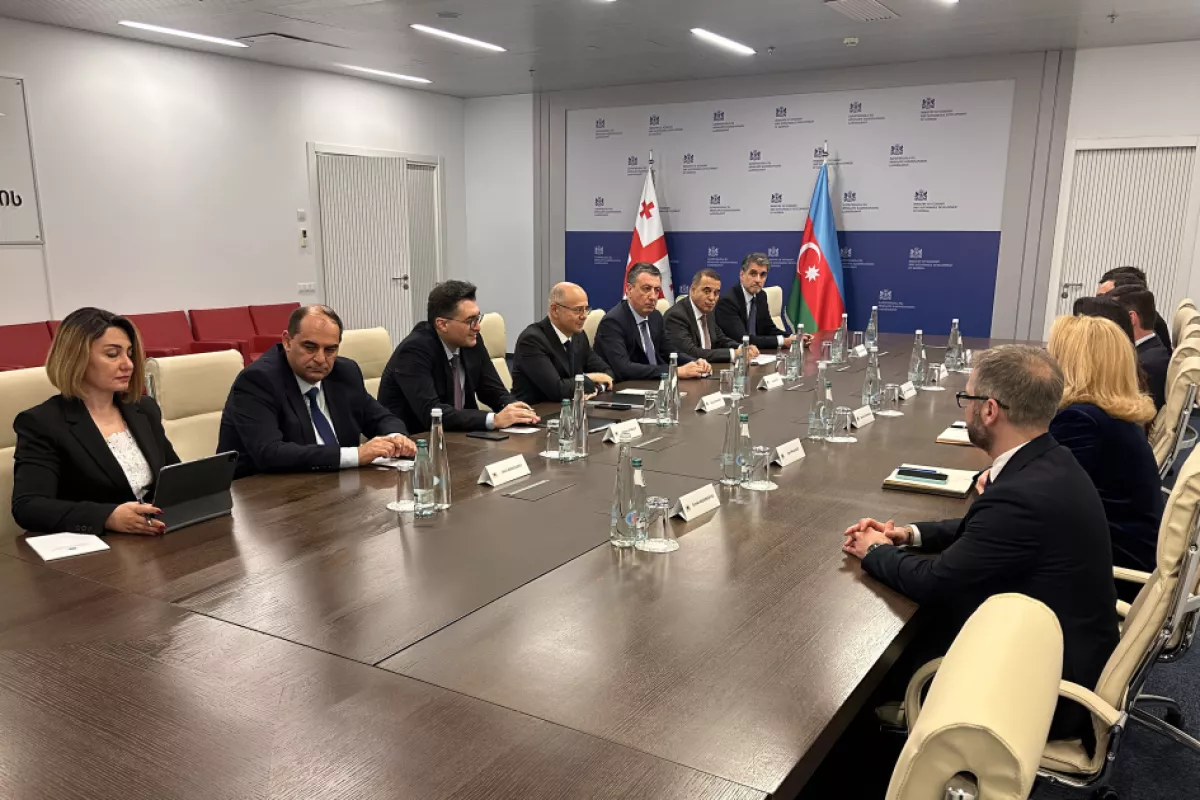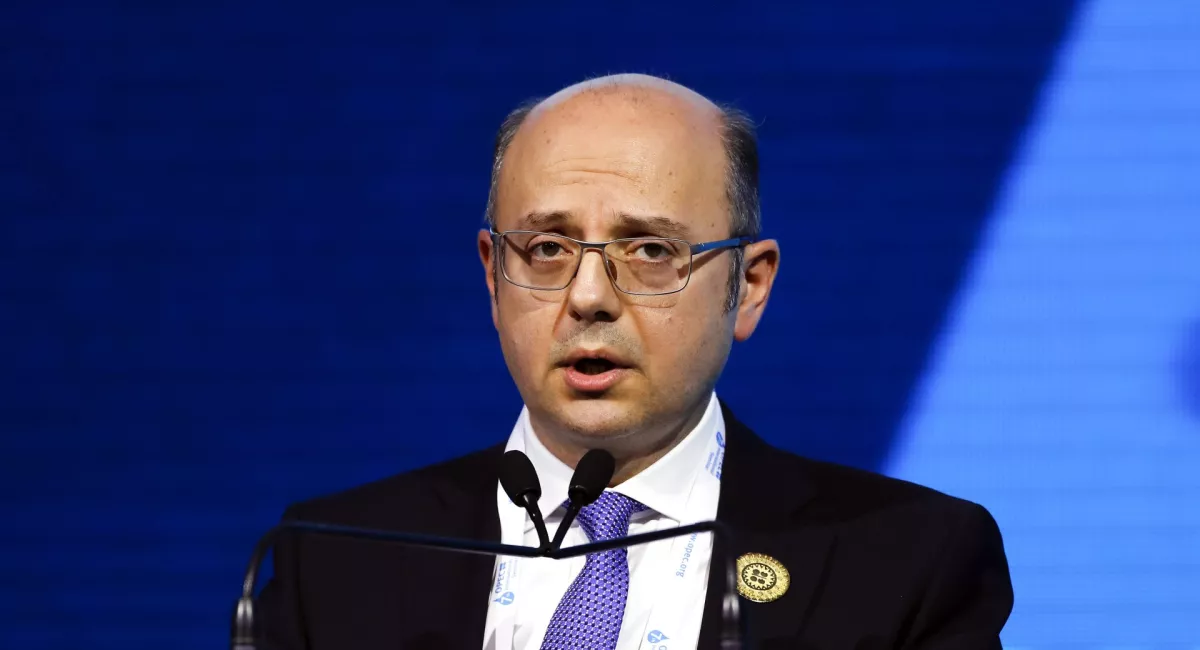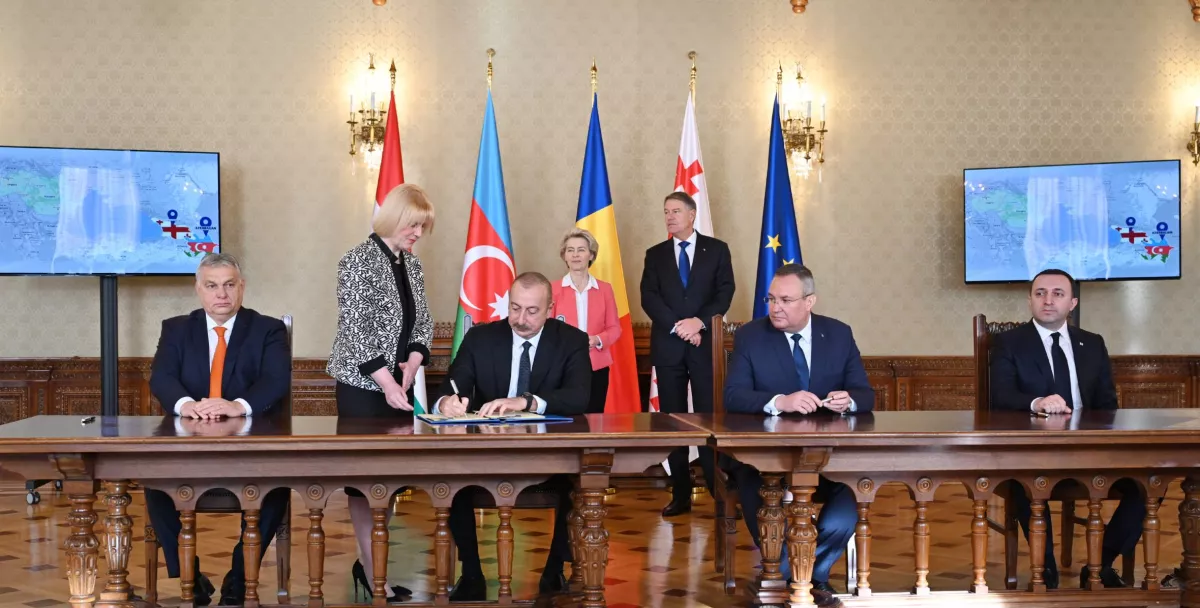Azerbaijan–Georgia energy alliance A path towards Europe and renewable resources
For more than a quarter of a century, the stable partnership between Azerbaijan and Georgia has driven the implementation of major energy and transport transit projects. This synergy continues to shape the development of the South Caucasus. Today, alongside the supply of oil and gas to European markets, the region is also preparing to play a significant role in strengthening Europe’s electricity security.
Azerbaijani–Georgian co-operation in this domain was discussed on November 14 during a meeting between Azerbaijan’s Minister of Energy, Parviz Shahbazov, and Georgia’s Minister of Economy and Sustainable Development, Mariam Kvrivishvili. The talks took place in Tbilisi on the margins of the 11th Ministerial Council and Steering Committee meeting of the project “Development and Transmission of Green Energy between the Governments of Azerbaijan, Georgia, Romania, and Hungary.”

For many years, Baku and Tbilisi have been closely connected through joint energy projects. A network of oil and gas transit pipelines crosses the territories of both countries, while Georgian ports host terminals for handling oil, fuel, and petrochemical products. These facilities enable the export of raw materials from Azerbaijan and Central Asian states to the markets of the Black Sea and Mediterranean regions, successfully contributing to Europe’s energy security.
Over the past three years, the two South Caucasus republics have also been focused on developing a project to export “green” electricity to the Turkish market, to subsequently transmit it to several Southeast European countries.

“We discussed the priorities of our strategic energy partnership and the development of new projects on a mutually beneficial basis with Mariam Kvrivishvili, the Minister of Economy and Sustainable Development of Georgia, in Tbilisi,” Azerbaijan’s Minister of Energy, Parviz Shahbazov, wrote on his X social media page, noting that SOCAR’s investments in Georgia have reached $2.1 billion.
During the ministers’ meeting in Tbilisi, it was noted that Azerbaijan remains Georgia’s key partner in the field of energy co-operation, and that the development of electricity transit projects is now a shared priority. In particular, the discussion focused on the Caspian–Black Sea–Europe Green Energy Corridor project, which holds strategic importance as a new energy link between Azerbaijan, Georgia, and Europe.
It was also emphasised that the Black Sea Submarine Cable and the Green Energy Corridor projects are progressing in parallel, and that enhanced coordination between them will improve implementation efficiency, deepen co-operation among participating states and companies, and ensure maximum support from the European Union (EU) and international financial institutions (IFIs).
Notably, Azerbaijan and Georgia—both committed to long-term co-operation with the EU in the field of green energy—are emerging as key drivers of electricity transit routes to the Turkish and European markets.

The foundation for this direction was laid on December 17, 2022, when Azerbaijan, Georgia, Romania, and Hungary signed a strategic partnership agreement to build the Black Sea Energy submarine power cable, with a planned capacity of 1 GW and a total length of 1,195 km. According to preliminary estimates, the implementation of this project will take three to four years, and the cable’s capacity will enable the annual export of up to four gigawatts of green electricity to Europe.
Since then, the project participants have launched work on the feasibility study (FS) for the energy bridge. The Italian consulting company CESI has been contracted to carry out the necessary studies for the submarine cable route between Georgia and Romania. The energy operators of the four countries have also established a joint venture, Green Energy Corridor Energy Company (GECO), to oversee implementation.
The partners are counting on the possibility of financing from the European Commission (EC), which, according to initial information, is prepared to allocate €2.3 billion to support the project.
The Caspian–Black Sea–Europe Energy Corridor (phases 1 and 2) has been included in the preliminary list of energy infrastructure projects to be evaluated under the next Ten-Year Network Development Plan (TYNDP) of the European Network of Transmission System Operators for Electricity (ENTSO-E).
According to Azerbaijan’s Ministry of Energy, the project initiators submitted their applications for inclusion in the plan during the first stage in April–May 2025. Following an assessment of compliance with the selection criteria, ENTSO-E confirmed that the Green Energy Corridor project meets all required standards.
Throughout 2026, a cost–benefit analysis will be carried out for all projects included in the TYNDP 2026 portfolio, with the results expected to be published at the end of the year. Once all evaluation stages are complete, the Black Sea Energy corridor will see its prospects significantly strengthened for inclusion in European Commission (EC) funding programmes and other EU support mechanisms.
Baku and Tbilisi are keen to accelerate the preparatory stages, as Azerbaijan is simultaneously involved in the Central Asia–Azerbaijan Green Energy Corridor project, which is being developed in parallel with Black Sea Energy.
“Azerbaijan, Kazakhstan, and Uzbekistan are actively working on integrating their power systems. By the end of this year, we also expect to complete the feasibility study for a major energy interconnector project that will link the Caspian Sea to the future Black Sea Energy infrastructure,” said Javid Abdullayev, Director of the State Agency for Renewable Energy under Azerbaijan’s Ministry of Energy, speaking at the 13th Caspian Energy Forum 2025 held in Baku in late October. “This project is a strategic component in the development of green energy and regional integration, creating the foundation for exporting renewable electricity from Azerbaijan to Europe.”
According to the head of the Agency, once the current stage is completed, work will move to the next phase: the process of establishing a joint venture (JV) to implement the Caspian Sea seabed interconnector will soon be finalised, with its headquarters to be located in Baku.
As reported recently by the Ministry of Energy, the selection of a consulting company to prepare the feasibility study for the Central Asia–Azerbaijan Green Energy Corridor is now nearing completion. Once the contract is signed, the development of the study is expected to begin before the end of the year.

In addition, under the memorandum signed in April this year, the Asian Development Bank (ADB) has decided to allocate approximately $2 million to support analytical and expert assessments for the project, with the relevant technical specifications already agreed and approved.
Notably, alongside the projects mentioned above, the Ministry of Energy is also overseeing the implementation of two other energy corridors — Azerbaijan–Türkiye–Europe and Azerbaijan–Georgia–Türkiye–Bulgaria. These initiatives envisage the use of the transit potential of the Zangezur Corridor and the Nakhchivan Autonomous Republic. They are likewise aimed at facilitating the transmission of electricity generated from renewable sources — including in the Karabakh region’s green energy zone and from offshore wind power in the Caspian Sea — to Turkish and European markets.
This topic was also discussed on November 14 in Tbilisi, where the sides exchanged views on the ongoing development of the feasibility study for the interconnector intended to enhance electric connectivity between Azerbaijan, Georgia, Türkiye, and Bulgaria.
By 2027, Azerbaijan plans to implement ten major renewable energy projects, providing around 2 GW of installed capacity and attracting approximately $2.7 billion in foreign investment. Over the following four to five years, Azerbaijan intends to export about 65 per cent of the renewable energy it produces. Countries in Central Asia are moving in a similar direction, as is Georgia, which possesses significant renewable energy potential — around 90 per cent of its electricity is generated by hydropower plants, with surplus output expected to be exported to global markets.
“The large-scale efforts currently underway in Azerbaijan’s renewable energy sector are aimed not only at increasing the share of these resources in the domestic energy system to roughly 40 per cent by 2030, but also at building regional and global partnerships,” Minister Parviz Shahbazov noted recently at the 16th Eurasian KAZENERGY Forum. “Intensive work is underway to ensure the export of four out of six gigawatts of wind and solar power that will be generated onshore and offshore in Azerbaijan by 2032, through the Caspian–Black Sea–Europe Green Energy Corridor to Europe.”








